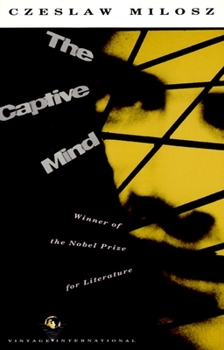The Captive Mind
Select Format
Select Condition 
Book Overview
The best known prose work by the winner of the 1980 Nobel Prize for Literature examines the moral and intellectual conflicts faced by men and women living under totalitarianism of the left or right.
Format:Paperback
Language:English
ISBN:0679728562
ISBN13:9780679728566
Release Date:August 1990
Publisher:Vintage
Length:272 Pages
Weight:0.51 lbs.
Dimensions:0.6" x 5.1" x 8.0"
Customer Reviews
5 ratings
The reasons why
Published by Thriftbooks.com User , 21 years ago
I often wonder as I read about the horrors committed by the worst regimes in history, how the people that perpetrate crimes against humanity can live with themselves. What is the motive and reasoning of those who praise the slaughter of innocents? The Captive Mind sheds a little bit of light into these darkest corners of the human psyche. It describes the path that leads righeous people on the road to immorality, written by a man who, along with his friends and comerads, traveled that road but took another path before he came to his final destination.
The Devil's Arguments, In His Own Language
Published by Thriftbooks.com User , 23 years ago
In the forward to this remarkable book Milosz writes that he wants to give the totalitarian point of view "in his own words, from his own point of view." The result is this ambitious, fascinating tour of the human mind twisted by the lies of the culture that surroundes it. It's a schizophrenic place that resembles the scarier novels of the noir writer Jim Thompson. There's nothing solid to cling to; everything dissolves into fear and loathing. Milosz turns his poetical gifts to the case studies of several Polish intellectuals who became entangled with the Communist party. Milosz doesn't name them but one is clearly Tadeusz Borowski, the author of the Holocaust short story collection "This Way for the Gas, Ladies and Gentlemen." The title of that book in Polish was "The Stony World", which reflected how Borowski, an Auschwitz survivor, came to see the world--as dominated by force, without effective moral constraint. Milosz depicts Borowski as a man who sought shelter under the protection of the strongest earthly power available--the Communists--but was unable finally to justify the price of that loyalty (he committed suicide.) What keeps someone from succumbing to "Ketman" (the two-facedness that Orwell called "double-think?) Milosz implies the answer is religious faith, which allows one to trust in an objective truth beyond the lies and terror of the stony world (he was a devout Catholic.) This book is a must read for anyone who wants to keep the world from stealing his soul.
Exceptional depiction of the communist mind
Published by Thriftbooks.com User , 24 years ago
This short volume of essays is one of the finest books I have ever read. It is not for nothing that Milosz was awarded the Nobel Prize for Literature. The discussions of the Baltics and Poland under communism are horrifying, profound, and stimulate the deepest thought and emotions. Essential reading for those interested in man's freedom, and in the contrasts between true religion and the false diety of historical "necessity".
Communist Intellectual is an Oxymoron.
Published by Thriftbooks.com User , 25 years ago
Never have I read a more vivid and convincing thesis defending the virtues of intellectual freedom. Though frequently difficult to read--the author (or the translator) shifts frequently from first to second to third person (and back again) in mid paragraph--the work is central to understanding not only the intellectual seductiveness of the "rule of philosophy" but, more importantly and generally, the dangers of intellectual conformity. Milosz's dissection of intellectuals' attraction to leftist social systems becomes a defense of open society in both the intellectual and general communities. We come to understand most fundamentally the concept of intellectual freedom, and how the elimination of it becomes the ultimate goal of authoritarian leftist politics... despite claims otherwise.Many intellectuals believe that their interests are best served by socialism or communism. Milosz explains why they are frequently fooled into believing this, and why many of the very components of socialism and communism that intellectuals most covet--freedom from vulgar market forces and important roles in the administration of society--are the very forces that strip them of their liberty. He illustrates this process with four character examples.Though written in the throes of the Cold War, this work could not be more timely. And though it is written as an attack on Communism (with a big "C") and is rife with often knee-jerk anti-Russian rhetoric, it's arguements can be easily applied to all forms of totalitarianism, both left and right. Mostly, Milosz is attempting to defend the chaotic human condition from idealogical molding and, considering contemporary encroachments of politics, government, and religion into the lives of human beings, this book is as valid and important today as it was in 1953. Not to be missed.
Required reading in the 20'th century
Published by Thriftbooks.com User , 25 years ago
"It was only toward the middle of the twentieth century that the inhabitants of many European countries came, in general unpleasantly, to the realization that their fate could be influenced directly by intricate and abtruse books of philosophy". That's how this book begins, and it captures Milosz's major theme: the vast difference between "abtruse books of philosophy" and real human beings. In a series of connected essays, he studies that difference, and the ways in which people respond when they're forced to deny it. Most of the essays tell the stories of writers that Milosz knew in Warsaw before the war, and the different routes they took to becoming instruments of communist propaganda. Of the other essays, the one most powerful to an American reader is "Looking to the West", which starts with Milosz being asked whether Americans are really stupid. The writing is beautiful and vivid. I highly recommend this book to anybody who dislikes the oversimplifications of ideology. I recommend it even more highly to anybody who doesn't.






